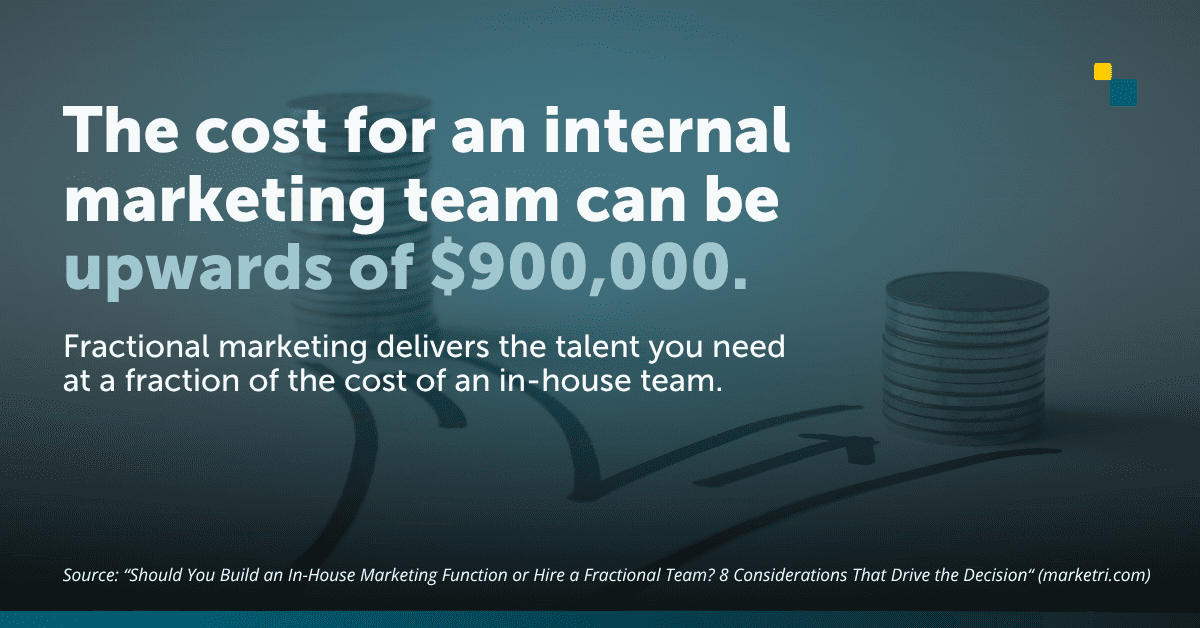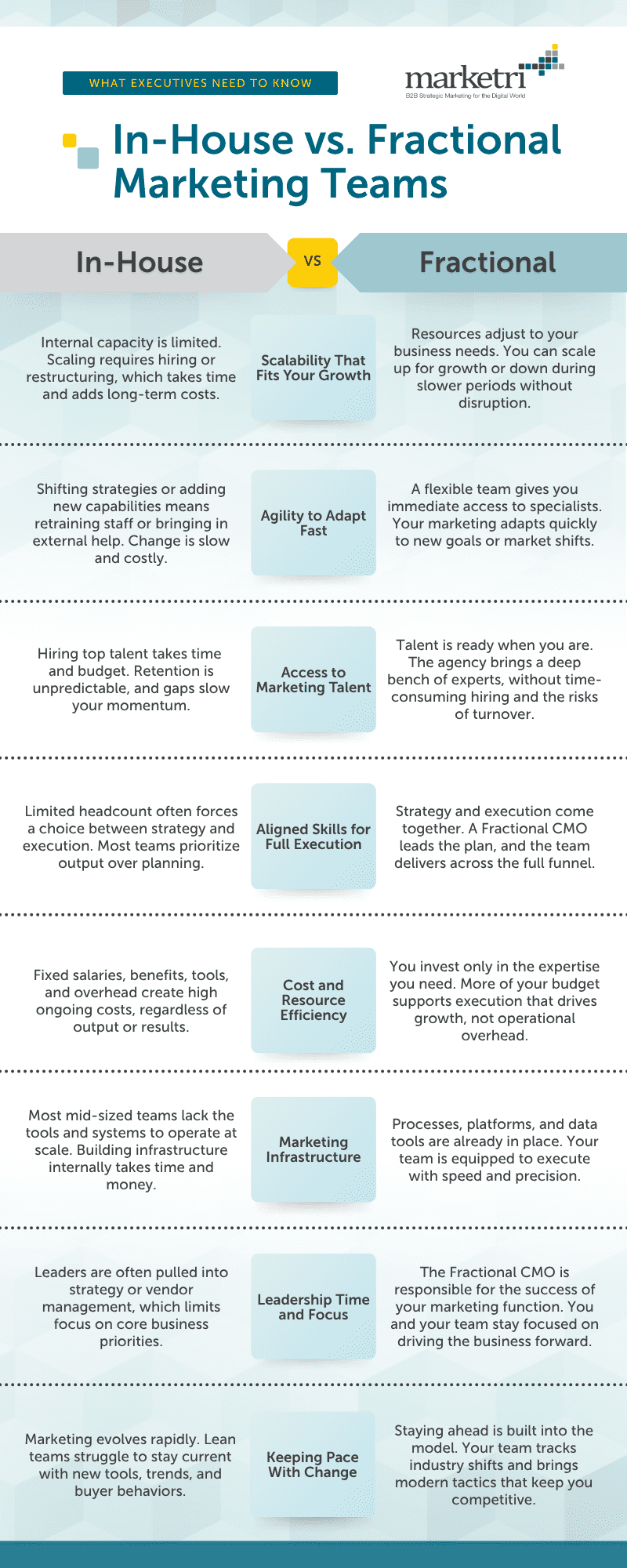Should You Build an In-House Marketing Function or Hire a Fractional Team? 8 Considerations That Drive the Decision
Growth-minded businesses are always seeking ways to generate better results and a higher ROI from every function, including marketing. You can’t afford to waste budget on marketing that doesn’t yield predictable, sustainable growth.
But what’s the best way for a middle market company to staff a revenue-generating marketing engine: Build up a group of full-time employees (FTEs) or hire a fractional marketing team? These 8 considerations will help you make the optimal choice.
What Triggers the Conversation?
Many factors can prompt you to rethink your marketing function. In our experience, middle-market businesses with aggressive growth goals that are backed by private equity, undergoing a leadership or ownership transition, or facing new competitive pressures tend to question whether their marketing structure is up to the task.
And with good reason.
Most mid-sized companies try to make do with a solo marketer—a generalist tasked with everything from marketing strategy to execution, across all the specialized disciplines modern marketing requires. Some hire a junior-level coordinator; others ask a current employee to add marketing to their plate. To fill expertise gaps, they might supplement with freelancers who don’t work in tandem, need extensive oversight, and aren’t tied into the business’s strategy.
Regardless of the specific setup, it rarely generates results.
That’s when business owners begin to wonder: Should we expand our in-house marketing team? Or is fractional marketing the better approach?
8 Considerations When Choosing Between In-House and Fractional Teams
If you want to turn your marketing into a revenue generator and you’re deciding between adding staff or hiring a fractional team, keep these factors in mind as you weigh the options.
Scalability
Whether you’re expanding into a new market, introducing a new service, or targeting an additional customer segment, your marketing needs to scale to support those objectives. Or you might need to ramp up your marketing in sync with peak selling periods. But a fixed internal team can’t keep taking on more volume. At some point, the workload outstrips capacity.
Scalability is one factor where fractional marketing has the edge. A fractional team can scale up or down as your needs change, without requiring long-term investments in permanent staff. The size and make-up of the team can flex to align with your goals, strategy, and needs.
Agility
As your business evolves or the market shifts, so will your marketing needs. Maybe you’re pivoting your business strategy and need an experienced strategist to revamp your marketing plan. Perhaps you’re looking to leverage AI to improve marketing efficiency and need an expert who’s already done it successfully. Or you’re targeting a whole new type of buyer and need to explore the best ways to attract and nurture them through the buying journey—without falling victim to common revenue leaks.
An in-house marketing team doesn’t give you the agility to tap different talent as your needs shift. But a fractional team does.
Fractional marketing allows you to break free from the constraints of an in-house staff and leverage the specialized expertise of a larger pool of experienced marketing professionals. With a fractional team as your partner, you can access the precise resources and skillsets you need at any time. You also gain a Fractional Chief Marketing Officer (CMO) who will develop agile marketing strategies and adapt them as conditions change.
Talent Acquisition
It’s never been more challenging to attract and retain marketing talent. Middle-market companies don’t have the budget to compete with larger organizations for the best candidates. Hiring timelines can slow your marketing progress. And even if you hire a marketing gem, there’s no guarantee they’ll stay.
Partnering with a fractional marketing team frees you from the burden (and distraction) of finding the right marketing talent for your needs. And a fractional agency has a talent pool ready to go—no time lost to the hiring process.
Skill Alignment
Successful marketing demands a go-to-market strategy and plan that’s driven by data, grounded in research, and executed flawlessly. But it’s the incredibly rare professional who can handle both the strategy and execution of a revenue-generating marketing plan. And since most middle-market companies can’t hire a CMO and a team of tacticians, they typically default to the execution side.
Fractional marketing eliminates the need to sacrifice strategy for execution, because it combines both through a seamless, coordinated team. A Fractional CMO develops a customized strategy and full-funnel marketing plan to drive new revenue, and they oversee the fractional team that executes your plan with urgency and precision.
Cost
Salary.com says the average CMO earns over $360,000. Add in a marketing project manager, content marketer, digital marketing manager, and graphic designer, and the cost for an internal marketing team is upwards of $900,000. Now layer on the other marketing functions you might need to supplement with freelance help—like PR, web development, and SEO—and the total cost easily tops $1 million. That’s well out of reach from most mid-sized companies. (And that doesn’t include training expenses, equipment, or the cost of turnover.)

True to its name, fractional marketing delivers the talent you need at a fraction of the cost of an in-house team. For a much lower investment, a fractional agency provides the exact skillsets and expertise you need. That includes a Fractional CMO who will develop and lead the execution of a full-funnel marketing plan to drive predictable growth. By eliminating unnecessary overhead, fractional marketing also leaves more budget for execution that drives growth.
Infrastructure
Turning marketing into a growth-generating engine requires more than the right people. It takes the proper processes, tools, and technologies to execute a marketing plan with precision and urgency. But most mid-sized businesses don’t have that infrastructure in place. And without it, a lean internal team will find it difficult to operationalize marketing effectively.
Hiring a fractional marketing agency eliminates infrastructure concerns. Your partner will already have everything in place—including processes built on best practices, technology that drives consistency and efficiency, and tools that equip them to optimize your marketing based on data.
Leadership Bandwidth
Middle-market business owners often get pulled into marketing out of necessity. If you’re relying on a solo generalist, you might need to step in on the strategy side. If you’re juggling disparate freelancers, you might get involved in overseeing their efforts. And that leaves you less time and energy to spend on your core business.
A fractional marketing arrangement gives you back that time and energy. Your Fractional CMO takes on the strategy function, working cross-functionally with little guidance needed. And your fractional team executes your marketing plan across the entire revenue funnel. Now, you and your staff can devote your attention to other critical functions of the business.
Rapid Evolution of Marketing
This might sound like a nice-to-have. But in a world where marketing is changing at warp speed, it’s actually a must-have.
The evolution in digital search behavior is just one example: Thanks to AI-powered tools, your buyer likely isn’t using the traditional Google search to find you. If you don’t know how this technology shift is changing their behavior, you’ll fall back on outdated marketing approaches that no longer drive strong results. And AI-driven marketing trends aren’t the only changes affecting how you reach the ideal buyers and convert them to customers.
A lean in-house marketing team doesn’t have time to keep a finger on the pulse of this rapidly evolving landscape. But a fractional marketing partner does. In fact, it’s crucial to their business. That’s why the ability to stay up to date is a key consideration when deciding between hiring a marketing team vs. an agency.
In-House vs. Fractional Marketing? The Choice is Clear
When business owners evaluate their options for staffing the marketing function, most come to the same conclusion: The fractional model is the best marketing setup for professional services firms.
The fractional marketing approach gives you the scalability and agility to adapt your marketing to changing needs. It allows you to tap the exact talent and skillsets you need at any time, without the high cost and challenges of hiring and retaining permanent staff. It eliminates the need to invest in and maintain marketing infrastructure. And by shifting this function to an experienced partner, it allows you to focus more attention on your core business and avoid trying to keep up with a fast-changing marketing landscape.
For B2B companies that take the fractional marketing path, another choice is equally clear: Marketri is the fractional marketing agency best equipped to drive sustainable growth.
As your single-source B2B marketing consultants, we unify and deliver everything you need to turn your marketing into a growth-generating engine, including:
- Strategy: Marketri’s Fractional CMO services include a customized, research-driven go-to-market strategy and plan.
- Execution: Our team executes your marketing plan flawlessly, leveraging advanced AI-powered tools that optimize efficiency and effectiveness.
- Analytics: We measure your marketing against key performance indicators (KPIs) that matter to your business.
- Optimization: We use data to drive decisions about how to adjust your marketing to achieve the best results.
Schedule a free consultation to learn how Marketri’s fractional marketing services outperform the internal staffing model by generating more growth, faster.






